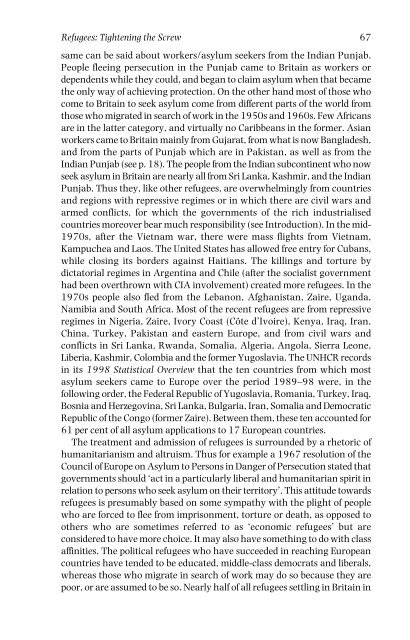Open%20borders%20The%20case%20against%20immigration%20controls%20-%20Teresa%20Hayter
Open%20borders%20The%20case%20against%20immigration%20controls%20-%20Teresa%20Hayter
Open%20borders%20The%20case%20against%20immigration%20controls%20-%20Teresa%20Hayter
Create successful ePaper yourself
Turn your PDF publications into a flip-book with our unique Google optimized e-Paper software.
Refugees: Tightening the Screw 67<br />
same can be said about workers/asylum seekers from the Indian Punjab.<br />
People fleeing persecution in the Punjab came to Britain as workers or<br />
dependents while they could, and began to claim asylum when that became<br />
the only way of achieving protection. On the other hand most of those who<br />
come to Britain to seek asylum come from different parts of the world from<br />
those who migrated in search of work in the 1950s and 1960s. Few Africans<br />
are in the latter category, and virtually no Caribbeans in the former. Asian<br />
workers came to Britain mainly from Gujarat, from what is now Bangladesh,<br />
and from the parts of Punjab which are in Pakistan, as well as from the<br />
Indian Punjab (see p. 18). The people from the Indian subcontinent who now<br />
seek asylum in Britain are nearly all from Sri Lanka, Kashmir, and the Indian<br />
Punjab. Thus they, like other refugees, are overwhelmingly from countries<br />
and regions with repressive regimes or in which there are civil wars and<br />
armed conflicts, for which the governments of the rich industrialised<br />
countries moreover bear much responsibility (see Introduction). In the mid-<br />
1970s, after the Vietnam war, there were mass flights from Vietnam,<br />
Kampuchea and Laos. The United States has allowed free entry for Cubans,<br />
while closing its borders against Haitians. The killings and torture by<br />
dictatorial regimes in Argentina and Chile (after the socialist government<br />
had been overthrown with CIA involvement) created more refugees. In the<br />
1970s people also fled from the Lebanon, Afghanistan, Zaire, Uganda,<br />
Namibia and South Africa. Most of the recent refugees are from repressive<br />
regimes in Nigeria, Zaire, Ivory Coast (Côte d’Ivoire), Kenya, Iraq, Iran,<br />
China, Turkey, Pakistan and eastern Europe, and from civil wars and<br />
conflicts in Sri Lanka, Rwanda, Somalia, Algeria, Angola, Sierra Leone,<br />
Liberia, Kashmir, Colombia and the former Yugoslavia. The UNHCR records<br />
in its 1998 Statistical Overview that the ten countries from which most<br />
asylum seekers came to Europe over the period 1989–98 were, in the<br />
following order, the Federal Republic of Yugoslavia, Romania, Turkey, Iraq,<br />
Bosnia and Herzegovina, Sri Lanka, Bulgaria, Iran, Somalia and Democratic<br />
Republic of the Congo (former Zaire). Between them, these ten accounted for<br />
61 per cent of all asylum applications to 17 European countries.<br />
The treatment and admission of refugees is surrounded by a rhetoric of<br />
humanitarianism and altruism. Thus for example a 1967 resolution of the<br />
Council of Europe on Asylum to Persons in Danger of Persecution stated that<br />
governments should ‘act in a particularly liberal and humanitarian spirit in<br />
relation to persons who seek asylum on their territory’. This attitude towards<br />
refugees is presumably based on some sympathy with the plight of people<br />
who are forced to flee from imprisonment, torture or death, as opposed to<br />
others who are sometimes referred to as ‘economic refugees’ but are<br />
considered to have more choice. It may also have something to do with class<br />
affinities. The political refugees who have succeeded in reaching European<br />
countries have tended to be educated, middle-class democrats and liberals,<br />
whereas those who migrate in search of work may do so because they are<br />
poor, or are assumed to be so. Nearly half of all refugees settling in Britain in


